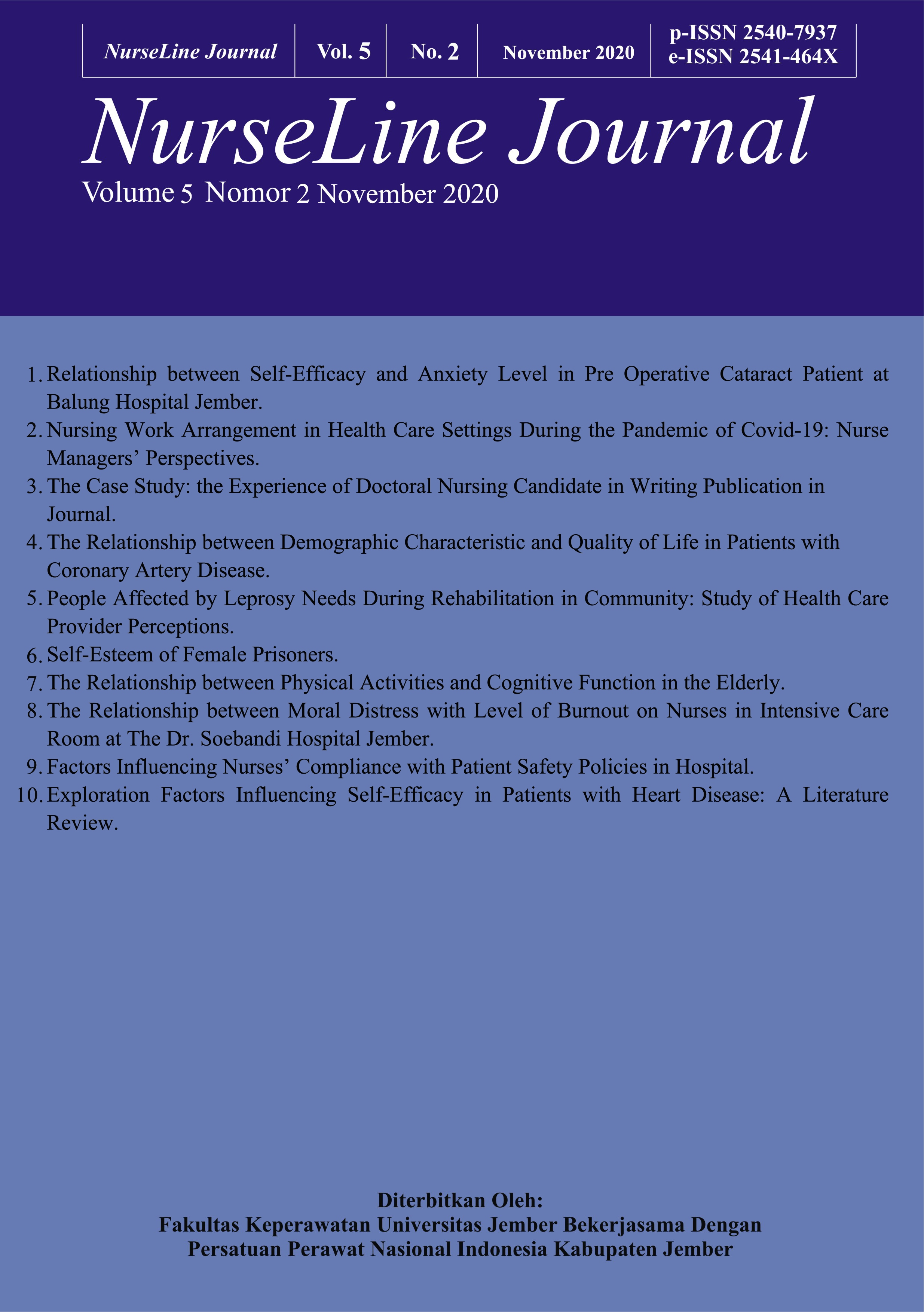Exploration Factors Influencing Self-Efficacy in Patients with Heart Disease: A Literature Review
DOI:
https://doi.org/10.19184/nlj.v5i2.17005Keywords:
Self Efficacy, Heart Disease, Cardiovascular disease, factors, Self Efficacy, Heart Disease, Cardiovascular disease, factorsAbstract
Heart disease is the top cause of death worldwide. Self-efficacy is one of the fundamental factors contributing to self-management programs among patients with heart disease. Cardiac patients with good self-efficacy will participate in disease management, improve health status, better self-care behavior, and a higher level of quality of life. Factors affecting self-efficacy need to be identified for stratified plan intervention strategies; therefore, the goal will achieve significantly. The Purpose of this study to identify factors that influence self-efficacy in patients with heart disease. Literature research from 2013-2019, obtained from the five largest databases consist of Pubmed, Google Scholar, CINAHL, Medline and PsycINFO by using keywords "Self Efficacy," "Cardiovascular Disease," "Heart Disease," and "Self Efficacy and Cardiovascular Disease "and Self Efficacy and Heart Disease". Five articles were further analyzed, and ten factors affecting self-efficacy are: 1) Age, 2) Income, 3) Social-economy, 4) Body mass index, 5) Experience on health education, 6) Risk factors awareness, 7) Social support, 8) Depressive symptoms, 9) Adherence and 10) Physical activity. The influence factors of self-efficacy, including demographic characteristics, clinical status, health education, awareness of risk factors, and psychosocial.
Downloads
References
Ambrose, J. A., & Singh, M. (2015). Pathophysiology of coronary artery disease leading to acute coronary syndromes. F1000Prime Reports, 7(January), 1–5. https://doi.org/10.12703/P7-08
Bandura A (1977) Self-efficacy: toward aunifying theory of behavioral change. Psychological Review 84, 191–215.
Banik, A., Schwarzer, R., Knoll, N., Czekierda, K., & Luszczynska, A. (2018). Self-efficacy and quality of life among people with cardiovascular diseases: A meta-analysis. Rehabilitation Psychology, 63(2), 295-312. doi: 10.1037/rep0000199
Benjamin EJ, Muntner P, Alonso A, Bittencourt MS, Callaway CW, Carson AP, Chamberlain AM, Chang AR, Cheng S, Das SR, Delling FN, Djousse L, Elkind MSV, Ferguson JF, Fornage M, Jordan LC, Khan SS, Kissela BM, Knutson KL, Kwan TW, Lackland DT, Lewis TT, Lic, V. S. (2019). Heart Disease and Stroke Statistics-2019 At-a-Glance Heart Disease, Stroke and other Cardiovascular Diseases. American Heart Association, 1–5. Retrieved from https://healthmetrics.heart.org/wp- content/uploads/2019/02/At-A-Glance-Heart- Disease-and-Stroke-Statistics-–-2019.pdf
Chair, S. Y., Wong, K. B., Tang, J. Y. M., Wang, Q., & Cheng, H. Y. (2015). Social support as a predictor of diet and exercise self-efficacy in patients with coronary artery disease. Contemporary Nurse, 51(2–3), 188–199. https://doi.org/10.1080/10376178.2016.1171 726
Dickson, V. V., Buck, H., & Riegel, B. (2013). Multiple comorbid conditions challenge heart failure self-care by decreasing self-efficacy. Nursing Research, 62(1), 2–9. https://doi.org/10.1097/NNR.0b013e3182733 7b3
Hinton, W., McGovern, A., Coyle, R., Han, T. S., Sharma, P., Correa, A., … De Lusignan, S. (2018). Incidence and prevalence of cardiovascular disease in English primary care: A cross-sectional and follow-up study of the Royal College of General Practitioners (RCGP) Research and Surveillance Centre (RSC). BMJ Open, 8(8), 1–9. https://doi.org/10.1136/bmjopen-2017- 020282
Kang, Y., & Yang, I. S. (2013). Cardiac self-efficacy and its predictors in patients with coronary artery diseases. Journal of Clinical Nursing, 22(17–18), 2465–2473. https://doi.org/10.1111/jocn.12142
Kang, Y., Yang, In-suk, & Kim, N. (2010). Correlates of Health Behaviors in Patients. Asian Nursing Research, 4(1), 1–11.
Katch, H. (2010). The role of self-efficacy in cardiovascular disease self-management: a review of effective programs. Patient Intelligence, 33.
https://doi.org/10.2147/pi.s12624
Khan, S., & Ali, S. A. (2017). Exploratory study into awareness of heart disease and health care seeking behavior among Emirati women (UAE) - Cross sectional descriptive study. BMC Women’s Health, 17(1), 1–10. https://doi.org/10.1186/s12905-017-0445-4
Martos-Méndez, M. J. (2015). Self-efficacy and adherence to treatment: the mediating effects of social support. Journal of Behavior, Health & Social Issues, 7(2), 19-29.
Ornato, J. P., & Hand, M. M. (2014). Cardiology P atient P age Warning Signs of a Heart Attack. 2015–2017.
https://doi.org/10.1161/CIRCULATIONAHA
.113.006126
Park, L. G., Howie-Esquivel, J., Whooley, M. A., & Dracup, K. (2015). Psychosocial factors and medication adherence among patients with coronary heart disease: A text messaging intervention. European Journal of Cardiovascular Nursing, 14(3), 264–273. https://doi.org/10.1177/1474515114537024
Kementerian Kesehatan Republik Indonesia (2018). Laporan Nasional Riskesdas 2018. Retrieved from http://labmandat.litbang.depkes.go.id/images/download/laporan/RKD/2018/Laporan_Nasional_RKD2018_FINAL.pdf
Salari, A., Rouhi Balasi, L., Moaddab, F., Zaersabet, F., Nouri Saeed, A., & Habib Nejad, S. (2016). Patients’ Cardiac Self-Efficacy After Coronary Artery Angioplasty. Jundishapur Journal of Chronic Disease Care, inpress(inpress), 1–5.
Shaw, K. M., Theis, K. A., Self-Brown, S., Roblin, D. W., & Barker, L. (2016). Chronic Disease Disparities by County Economic Status and Metropolitan Classification, Behavioral Risk Factor Surveillance System, 2013. Preventing chronic disease, 13, E119-E119.
https://doi.org/10.17795/jjcdc-37251
Siow, E., Yin, D., Leung, P., Mi, E., Wong, L., Lam, W. H., … Hons, B. N. (2018). Do Depressive Symptoms Moderate the Effects of Exercise Self-efficacy on Physical Activity Among Patients With Coronary Heart Disease ? 00(0), 1–9. https://doi.org/10.1097/JCN.0000000000000 491
Sol, B. G., van der Graaf, Y., van Petersen, R., & Visseren, F. L. (2011). The effect of self-efficacy on cardiovascular lifestyle. European Journal of Cardiovascular Nursing, 10(3), 180-186.
Sullivan, M. D., Lacroix, A. Z., Russo, J., & Katon, W. J. (1998). Self-efficacy and self-reported functional status in coronary heart disease: A six-month prospective study. Psychosomatic Medicine, 60(4), 473–478. https://doi.org/10.1097/00006842- 199807000-00014
Sun, J., Buys, N., & Wang, X. (2012). Association between low income, depression, self-efficacy and mass-incident-related strains: An understanding of mass incidents in China. Journal of Public Health (United Kingdom), 34(3), 340–347.
https://doi.org/10.1093/pubmed/fdr107
Tovar, E. G., Dekker, R. L., Chung, M. L., Gokun, Y., Moser, D. K., Lennie, T. A., & Rayens, M.
K. (2016). Self-efficacy mediates the relationship of depressive symptoms and social support with adherence in patients with heart failure. Journal of Health Psychology, 21(11), 2673–2683.
https://doi.org/10.1177/1359105315583369 WHO. (2017). Cardiovascular Disease. Retrieved
from https://www.who.int/en/news- room/fact-sheets/detail/cardiovascular- diseases-(cvds)
Wang, N., & Chen, C. Y. (2018). Alcohol drinking and problems in young populations: the challenge in Asia. Current opinion in psychiatry, 31(4), 294-29








